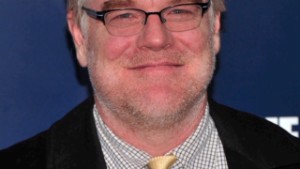He was a beefy 5-foot-10 but won an Oscar for playing the slight, 5-foot-3 Truman Capote. He had the booming voice of a deity but often played schlubs and conflicted characters.
He could be heartfelt and giving, as with his male nurse in "Magnolia" or rock critic in "Almost Famous," or creepily Machiavellian, such as the gamemaster in the latest "Hunger Games" movie.
Philip Seymour Hoffman was an actor who could be anybody.
"I don't know how he does it," director Mike Nichols told The New York Times Magazine in 2008. Nichols directed Hoffman on both stage ("The Seagull," "Death of a Salesman") and screen ("Charlie Wilson's War"). "Again and again, he can truly become someone I've not seen before but can still instantly recognize. ... He may look like Phil, but there's something different in his eyes. And that means he's reconstituted himself from within, willfully rearranging his molecules to become another human being."

"Philip Seymour Hoffman's precise, uncanny performance as Capote doesn't imitate the author so much as channel him, as a man whose peculiarities mask great intelligence and deep wounds," wrote Roger Ebert about 2005's "Capote."
Hoffman was found dead Sunday. Reports attribute his death to a drug overdose.For years, Hoffman was the kind of anonymous character actor who earned critical raves but was often unnoticed by the general public. He had an Everyman face -- burly enough to be an athlete, soft enough to be an artist, with an eye twinkle that could be either vicious (as in his "Mission: Impossible III" villain) or humorous (the frat-boyish Sandy in "Along Came Polly").
Consider the roles that earned him Academy Award nominations: a conniving writer ("Capote"), a cranky CIA desk jockey ("Charlie Wilson's War"), an upbeat, dissembling priest ("Doubt") and a charming, enigmatic cult leader ("The Master").
Or consider the ones that didn't: baseball manager Art Howe ("Moneyball"), suspicious Freddie Miles ("The Talented Mr. Ripley"), clever Plutarch Heavensbee ("The Hunger Games: Catching Fire").
The New York Times' Ben Brantley, who saw him on stage, was unequivocal. "One of the finest actors of his generation," he wrote in his review of the 2012 staging of "Death of a Salesman" -- even while finding Hoffman miscast in that production.
One of a kind everyman:
He's of a type harder to find in Hollywood these days, where movie-star looks and charisma often take precedence over the ability to disappear into a role. Indeed, even when movie stars do try to disappear, we're all too aware of the tricks, whether it's weight gain, a putty nose or an unfamiliar accent.
Movie stars sell tickets. Character actors -- and Hoffman, for all his intensity, was a character actor -- support movie stars.
That seemed OK with him. You could more often find him in challenging roles or secondary parts than leads. He liked to take chances.
He worked with director Paul Thomas Anderson ("Boogie Nights," "Magnolia," "The Master") before either was a big name, and Anderson provided him with a steady stream of interesting roles. He took small parts in such films as the dark comedy "Strangers with Candy," based on the unpleasant characters dreamed up by Amy Sedaris, Paul Dinello and Stephen Colbert, and "The Invention of Lying," Ricky Gervais' comedy about religion and atheism.
In some respects he followed the path of one of his heroes, Paul Newman, who had looks and magnetism to burn but wasn't shy about taking "character" parts, such as a broken-down lawyer in "The Verdict" or a ne'er-do-well in "Nobody's Fool." The latter featured Newman acting opposite Hoffman, as did the HBO miniseries "Empire Falls."
He also kept his talent sharp with frequent stage work and the kind of "one for me, one for them" movie philosophy that made sure he was both busy and successful.
The price of fame:
In recent years, he'd become a more recognizable face -- and persona. In a video that quickly made the rounds, his voice was dubbed into a trailer for the Joaquin Phoenix movie "Her," taking the place of Scarlett Johansson's operating system, Samantha. Where Johansson is relaxed, Hoffman is intense; where Johansson is helpful, Hoffman is wily. It neatly summed up his capabilities.
But with fame comes intrusion, and Hoffman seemed uncomfortable with the attention. He was a New York-based actor, not a movie star. It was a job, not an excuse to turn him into an open book.
"Somebody wanted me to talk about my personal life," he told the UK newspaper The Independent in 2012. "I'd rather not because my family doesn't have any choice. If I talk about them in the press, I'm giving them no choice. So I choose not to."
His death has left his colleagues in shock.
"We have lost a true artist," said Robin Wright in a statement. Wright worked with Hoffman in "Moneyball" and the forthcoming "A Most Wanted Man."
"He was a giant talent," said Tom Hanks, who co-starred with Hoffman in "Charlie Wilson's War."
But perhaps director Nichols was most succinct -- and heartfelt -- in describing the void left by Hoffman's death.
"No words for this," he said in a statement. "He was too great and we're too shattered."
"Great" is an all-too-appropriate word, as Hoffman himself used it when expressing his goals. Given his work and the circumstances of his death, a line from the 2008 New York Times Magazine profile seems more haunting today.
"For me, acting is torturous, and it's torturous because you know it's a beautiful thing," he said. "I was young once, and I said, 'That's beautiful and I want that.' Wanting it is easy, but trying to be great -- well, that's absolutely torturous".
No comments:
Post a Comment